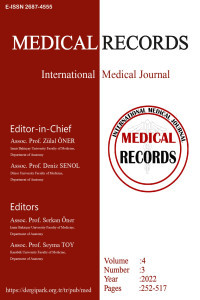The Consequences of Fasting During Pregnancy on the Thiole/Disulfide Balance: An Observational Study
The Consequences of Fasting During Pregnancy on the Thiole/Disulfide Balance: An Observational Study
Fasting, Oxidative stress, Pregnant women Ramadan, Thiol-disulfide homeostasis,
___
- Ünal K, Topçuoğlu C, Yücel Ç, et al. Effects of ramadan lifestyle on lipid profile and oxidative stress markers in adult males. J Clin Anal Med. 2019;10:5-9.
- Pamukcu Gunaydin G, Dogan NO, Cevik Y, et al. Evaluation of patients with renal colic that present to an emergency department during the month of Ramadan. JAEM. 2013;12:24-6.
- Alkandari JR, Maughan RJ, Roky R, et al. The implications of Ramadan fasting for human health and well-being. J Sports Sci. 2012;30:S9-19.
- Robinson T, Raisler J. “Each one is a doctor for herself”: Ramadan fasting among pregnant Muslim women in the United States. Ethn Dis. 2005;15:S1-99-103.
- Joosoph J, Abu J, Yu SL. A survey of fasting during pregnancy. Singapore Med J. 2004;45:583-6.
- Sies H. Oxidative stress: from basic research to clinical application. Am J Med. 1991;91:S31-8.
- Burton GJ, Jauniaux E. Oxidative stress. Best Pract Res Clin Obstet Gynaecol. 2011;25:287-99.
- Serdar Z, Gür E, Çolakoðullarý M, et al. Lipid and protein oxidation and antioxidant function in women with mild and severe preeclampsia. Arch Gynecol Obstet. 2003;268:19-25.
- Aksungar FB, Topkaya AE, Akyildiz M. Interleukin-6, C-reactive protein and biochemical parameters during prolonged intermittent fasting. Ann Nutr Metab. 2007;51:88-95.
- Al-Shafei AIM. Ramadan fasting ameliorates arterial pulse pressure and lipid profile, and alleviates oxidative stress in hypertensive patients. Blood Press. 2014;23:160-7.
- Asemi Z, Samimi M, Taghizadeh M, Esmaillzadeh A. Effects of Ramadan fasting on glucose homeostasis, lipid profiles, inflammation and oxidative stress in women with polycystic ovary syndrome in Kashan, Iran. Arch Iran Med. 2015;18:806-10.
- Zare A, Hajhashemi M, Hassan ZM, et al. Effect of Ramadan fasting on serum heat shock protein 70 and serum lipid profile. Singapore Med J. 2011;52:491-5.
- Chaouachi A, Coutts AJ, Wong DP, et al. Haematological, inflammatory, and immunological responses in elite judo athletes maintaining high training loads during Ramadan. Appl Physiol Nutr Metab. 2009;34:907-15.
- Ibrahim WH, Habib HM, Jarrar AH, Al Baz SA. Effect of Ramadan fasting on markers of oxidative stress and serum biochemical markers of cellular damage in healthy subjects. Ann Nutr Metab. 2008;53:175-81.
- Lee KH, Bartsch H, Nair J, et al. Effect of short-term fasting on urinary excretion of primary lipid peroxidation products and on markers of oxidative DNA damage in healthy women. Carcinogenesis. 2006;27:1398-403.
- Ozturk E, Balat O, Ugur MG, et al. Effect of Ramadan fasting on maternal oxidative stress during the second trimester: a preliminary study. J Obstet Gynaecol Res. 2011;37:729-33.
- Cremers CM, Jakob U. Oxidant sensing by reversible disulfide bond formation. J Biol Chem. 2013;288:26489-96.
- Biswas S, Chida AS, Rahman I. Redox modifications of protein–thiols: emerging roles in cell signaling. Biochem Pharmacol. 2006;71:551-64.
- Erel O, Neselioglu S. A novel and automated assay for thiol/disulphide homeostasis. Clin Biochem. 2014;47:326-32.
- Circu ML, Aw TY. Reactive oxygen species, cellular redox systems, and apoptosis. Free Radic Biol Med. 2010;48:749-62.
- Sies H. Role of reactive oxygen species in biological processes. Klin Wochenschr. 1991;69:965-8.
- Sanhal CY, Daglar K, Kara O, et al. An alternative method for measuring oxidative stress in intrahepatic cholestasis of pregnancy: thiol/disulphide homeostasis. J Matern Fetal Neonatal Med. 2018;31:1477-82.
- Colombo G, Rossi R, Gagliano N, et al. Red blood cells protect albumin from cigarette smoke–induced oxidation. PLoS One. 2012;7:e29930.
- Akkaya H, Uysal G, Büke B, et al. Evaluation of fetal serum thiol/disulphide homeostasis in deliveries complicated by nuchal cord. J Matern Fetal Neonatal Med. 2019;32:3543-7.
- Cetin O, Karaman E, Alisik M, et al. The evaluation of maternal systemic thiol/disulphide homeostasis for the short-term prediction of preterm birth in women with threatened preterm labour: a pilot study. J Obstet Gynaecol. 2022;42:1972-7.
- McBean GJ, Aslan M, Griffiths HR, Torrão RC. Thiol redox homeostasis in neurodegenerative disease. Redox Biol. 2015;5:186-94.
- Ege S, Akduman H, Bademkıran MH, et al. Maternal serum thiol/disulfide homeostasis in pregnancies complicated by fetal hypoxia. J Obstet Gynaecol (Lahore). 2021;41:44-8.
- Erol SA, Tanacan A, Altinboga O, et al. Evaluation of fetal serum thiol/disulfide homeostasis and ischemia-modified albumin levels in fetal distress. Fetal Pediatr Pathol. 2022;41:426-35.
- Kiremitli T, Kiremitli S, Erel O, et al. Dynamic thiol/disulphide homeostasis and ischemic modified albumin levels in isolated oligohydramnios. Taiwan J Obstet Gynecol. 2021;60:1038-42.
- Cakina S, Aydın B, Beyazit F. Evaluation of thiol/disulfide homeostasis in patients with gestational diabetes mellitus. Gynecol Endocrinol. 2020;36:1006-9.
- Onat T, Aydoğan Kırmızı D, Başer E, et al. The relationship between oxidative stress and preeclampsia. The serum ischemia-modified albumin levels and thiol/disulfide homeostasis. Turk J Obstet Gynecol. 2020;17:102-7.
- Cakar E, Ayvacı H, Karcaaltincaba D, et al. Thiol-disulfide homoestasis in pregnancies with fetal growth restriction. J Matern Fetal Neonatal Med. 2019;32:3974-9.
- Erol SA, Anuk AT, Tanaçan A, et al. An evaluation of maternal serum dynamic thiol-disulfide homeostasis and ischemia modified albumin changes in pregnant women with COVID-19. Turk J Obstet Gynecol. 2022;19:21-7.
- Yayın Aralığı: Yılda 3 Sayı
- Başlangıç: 2019
- Yayıncı: Zülal ÖNER
Retrospective Assessment of Forensic Facts Under 18 Years of Age in İzmir
Ferhat Turgut TUNÇEZ, Ece ERGÜN YEGEN, Derya GÜLMEZ ÖZ, Doğu Barış KILIÇÇIOĞLU
Assessment of the Relationship between Vitamin D Deficiency and Epin Calcanei
Nurmuhammet TAŞ, Buminhan SEFEROĞLU
The Importance of Perinatal Care Practices in Determining Pregnant Women's Satisfaction with Birth
Ece ÖCAL, Senem ALKAN AKALIN, Serap Mutlu ÖZÇELİK OTCU
Anatomical Analysis of Foramen Magnum: A 3D Slicer CT Study
Nihal GÜRLEK ÇELİK, Burcu AKMAN
Senem ALKAN AKALIN, Ece ÖCAL, Serap Mutlu ÖZÇELİK OTCU
Prevalence, Number and Localization of Wormian Bones in Anatolian Adult Dry Skulls
Abdullah ORTADEVECİ, Serdar BABACAN
Kubilay İŞSEVER, Ali MUHTAROĞLU, Furkan Ali UYGUR, Muhammet Burak KAMBUROGLU
Evaluation of Ventricular Arrhythmia Markers in Obstructive Sleep Apnea Syndrome Patients
Placental Histopathological Alterations in COVID-19 Infected Pregnancies
Esra CAN, Işıl TURAN BAKIRCI, Elif Gökçe DEVECİOĞLU GÜRŞEN, Hilal Serap ARIKAN
